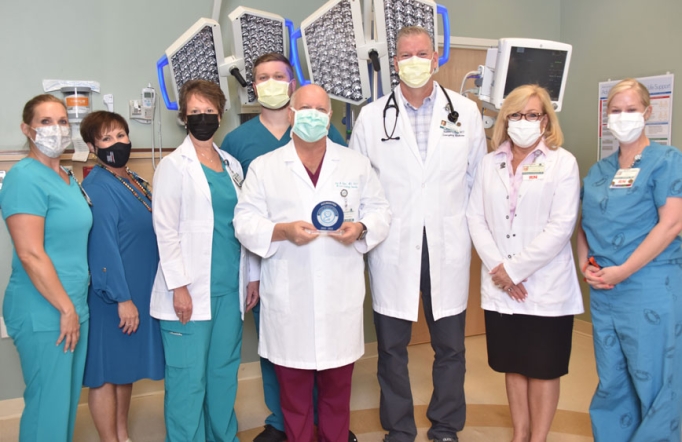McLeod Receives ACC Chest Pain Center
Re-accreditation

Dr. Alan Blaker, Dr. Thomas Lewis and VP Amanda Butler are pictured with Kim Medlin, Diane Osterman, Caleb Loveless, Debbie Whisenhunt and Ashley Gaskin who helped support the re-accreditation process for the Chest Pain Center.
The American College of Cardiology (ACC) has recognized McLeod Regional Medical Center for their demonstrated expertise and commitment in treating patients with chest pain. McLeod recently received re-accreditation for their Chest Pain Center with Primary PCI (percutaneous coronary intervention) and Resuscitation based on a rigorous onsite evaluation of the staff’s ability to evaluate, diagnose and treat patients who may be experiencing a heart attack. The Chest Pain Center of McLeod Regional Medical Center has been an accredited center since 2010.
Hospitals that have earned ACC Chest Pain Center with Primary PCI and Resuscitation Accreditation have proven exceptional competency in treating patients with heart attack symptoms and have primary PCI available 24/7 every day of the year. As required to meet the criteria of the accreditation designation, they comply with standard Chest Pain Center protocols and are equipped with a robust hypothermia program for post-cardiac arrest treatment. Hypothermia is used to lower the body temperature after a cardiac arrest to reduce the damage to the brain.
These facilities also maintain a “No Diversion Policy” for out-of-hospital cardiac arrest patients. When a hospital emergency department is on diversion, EMS temporarily diverts ambulance patients to other nearby hospitals. A “No Diversion Policy” for cardiac arrest patients means they would never be diverted to another hospital.
PCI is also known as coronary angioplasty. It is a non-surgical procedure that opens narrowed or blocked coronary arteries with a balloon to relieve symptoms of heart disease or reduce heart damage during or after a heart attack.
In addition to re-accreditation, McLeod Regional Medical Center received the American College of Cardiology’s National Cardiovascular Data Registry Chest Pain ̶ MI Registry Platinum Performance Achievement Award for 2022. McLeod is one of only 240 hospitals nationwide to receive this honor.
The award recognizes the commitment and success of McLeod in implementing a higher standard of care for heart attack patients. It also signifies that McLeod not only reaches but maintains an aggressive goal of treating these patients to standard levels of care as outlined by the American College of Cardiology/American Heart Association clinical guidelines and recommendations.
“Hospitals that are Chest Pain-accredited emphasize the importance of standardized diagnostic studies, effective evaluations and rapid treatment for all patients with chest pain and other heart attack symptoms,” said Dr. Alan Blaker, Executive Medical Director, McLeod Heart and Vascular Institute. “As a Platinum Performance Award recipient, McLeod also has demonstrated ourselves as leaders in setting the national standard for improving quality of care in heart attack patients.”
According to the Centers for Disease Control and Prevention, more than 730,000 Americans suffer a heart attack each year. The most common symptom of a heart attack for both men and women is chest pain or discomfort. However, women are more likely to have atypical symptoms. Other heart attack symptoms include, but are not limited to, tingling or discomfort in one or both arms, back, shoulder, neck or jaw, shortness of breath, cold sweat, unusual tiredness, heartburn-like feeling, nausea or vomiting, sudden dizziness and fainting.
“McLeod Regional Medical Center has demonstrated its commitment to providing their community with excellent heart care,” said Deepak L. Bhatt, MD, MPH, FACC, Chair of the ACC Accreditation Management Board. “ACC Accreditation Services is proud to award the McLeod Chest Pain Center with Primary PCI and Resuscitation Accreditation.”
Hospitals receiving Chest Pain Center Accreditation from the ACC must take part in a multi-faceted clinical process that involves: completing a gap analysis; examining variances of care, developing an action plan; a rigorous onsite review; and monitoring for sustained success. Improved methods and strategies of caring for patients include streamlining processes, implementing of guidelines and standards, and adopting best practices in the care of patients experiencing the signs and symptoms of a heart attack. Facilities that achieve accreditation meet or exceed an array of stringent criteria and have organized a team of doctors, nurses, clinicians, and other administrative staff that earnestly support the efforts leading to better patient education and improved patient outcomes.
-
McLEOD REGIONAL MEDICAL CENTER FLORENCE
843-777-2000 -
McLEOD DARLINGTON
843-777-1100 -
McLEOD DILLON
843-774-4111 -
McLEOD LORIS
843-716-7000 -
McLEOD SEACOAST
843-390-8100 -
McLEOD CHERAW
843-537-7881 -
McLEOD CLARENDON
803-433-3000



-
McLEOD REGIONAL MEDICAL CENTER FLORENCE
843-777-2000 -
McLEOD DARLINGTON
843-777-1100 -
McLEOD DILLON
843-774-4111 -
McLEOD LORIS
843-716-7000 -
McLEOD SEACOAST
843-390-8100 -
McLEOD CHERAW
843-537-7881 -
McLEOD CLARENDON
803-433-3000
 Find a Doctor
Find a Doctor  Locations
Locations  Services
Services